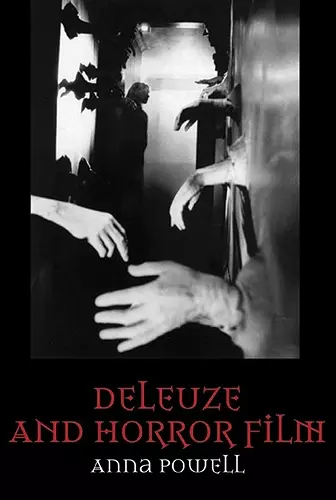Deleuze and Horror Film
Format:Hardback
Publisher:Edinburgh University Press
Published:24th Mar '05
Currently unavailable, and unfortunately no date known when it will be back

The horror film analysed from a Deleuzian perspective. This book argues that dominant psychoanalytic approaches to horror films neglect the aesthetics of horror. Yet cinematic devices such as mise en scene, editing and sound, are central to the viewer's visceral fear and arousal. Using Deleuze's work on art and film, Anna Powell argues that film viewing is a form of 'altered consciousness' and the experience of viewing horror film an 'embodied event'. The book begins with a critical introduction to the key terms in Deleuzian philosophy and aesthetics. These include: subjectivity/becoming, the body without organs, molecularity, time/duration, affect, movement/rhythm, space, anomaly and schizoanalysis. These concepts are then applied to horror films. Themes such as insanity, sensory response to film, the subject/object, fractured time, the body and cinematography are explored in horror films such as Jacob's Ladder, Dr Jekyll and Mr Hyde, Psycho, Silence of the Lambs, The Fly, A Nightmare on Elm Street, Alien Resurrection, The Others, The Shining, Interview with the Vampire, Bram Stoker's Dracula and Nosferatu. Features *A substantial new contribution to horror film theory *A critical introduction to key terms in Deleuzian philosophy and aesthetics *New readings of the classic horror canon and recent films *Analysis of horror styles, narrative and special effects. Deleuze and Horror Film was originally published in hardback in March 2005. The paperback edition was published in November 2006.
With its complex but fresh theories and inviting style, this work will enhance both film and gothic studies collections. Anna Powell's book is both visceral and intellectual. It deftly combines attentive accounts of specific films with broader theoretical speculation. Powell gets to the heart of what's compelling and addictive about horror films: their rhythms and intensities, the feelings they arouse, the ways they get under the skin of the viewer. -- Professor Steven Shaviro, Wayne State University Anna Powell's study seems an unlikely mash-up, combining the free-wheeling musings of French philosopher Gilles Deleuze on art cinema with the visceral frisson of an oft-despised genre, but the combination proves surprisingly fruitful... For the serious horror film scholar, Powell's study offers a welcome addition to the existing theoretical works. For the serious horror fan who does not quail before academic jargon, the book will open up many favorite films to additional aesthetic perspectives. For Deleuzian scholars, it may well provide new insight into the usefulness of frameworks usually applied only to a rarified genre of films-it may even offer the opportunity to appreciate the complexity of the much-maligned horror genre. -- K. A. Laity Journal of the Fantastic in the Arts With its complex but fresh theories and inviting style, this work will enhance both film and gothic studies collections. Anna Powell's book is both visceral and intellectual. It deftly combines attentive accounts of specific films with broader theoretical speculation. Powell gets to the heart of what's compelling and addictive about horror films: their rhythms and intensities, the feelings they arouse, the ways they get under the skin of the viewer. Anna Powell's study seems an unlikely mash-up, combining the free-wheeling musings of French philosopher Gilles Deleuze on art cinema with the visceral frisson of an oft-despised genre, but the combination proves surprisingly fruitful... For the serious horror film scholar, Powell's study offers a welcome addition to the existing theoretical works. For the serious horror fan who does not quail before academic jargon, the book will open up many favorite films to additional aesthetic perspectives. For Deleuzian scholars, it may well provide new insight into the usefulness of frameworks usually applied only to a rarified genre of films-it may even offer the opportunity to appreciate the complexity of the much-maligned horror genre.
ISBN: 9780748617470
Dimensions: unknown
Weight: 530g
240 pages